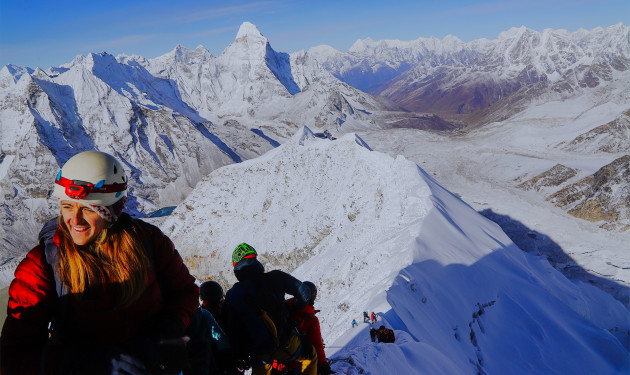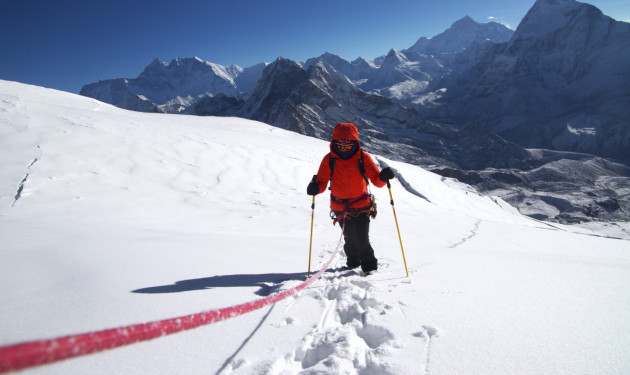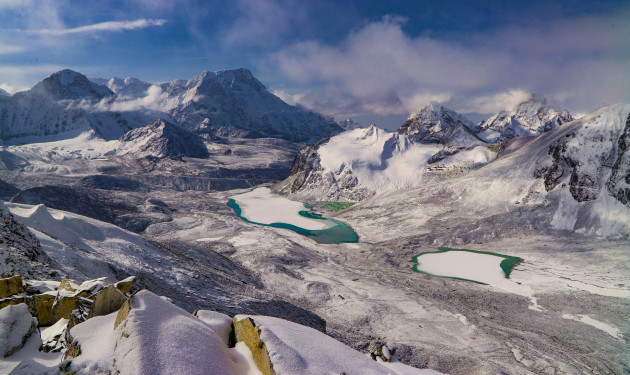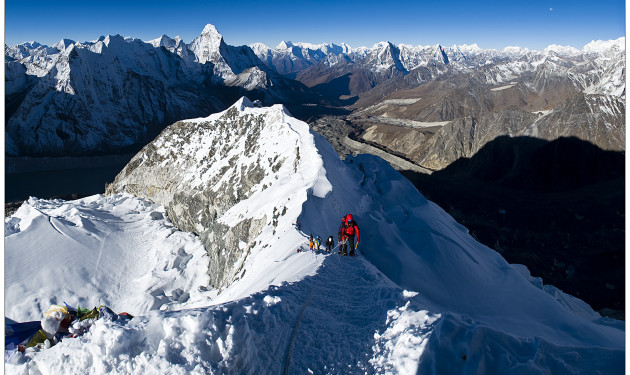Three Peaks in Everest Region is a physically and mentally challenging adventure through the Khumbu Valley. Climbing Three Peaks in Everest Region is a great way to experience the beauty and challenge of the Khumbu Himalaya. Our Three Peaks in Everest Region combines three of the highest trekking peaks in Nepal: Mera Peak (6,476 m), Island Peak (6,189 m), and Lobuche East Peak (6,119 m). It is a physically demanding trip but also an enriching experience that takes you through the stunning Khumbu region of Nepal, making this trip an adventure of a lifetime.
Mera Peak is the highest permitted trekking peak in the Everest region and offers stunning views of the surrounding mountains, including Mount Everest (8848.86m). Island Peak (Imja Tse) is one of the most popular trekking peaks in the Khumbu region, well known for its challenging climb, and Lobuche East Peak is one of the most challenging trekking peaks in the Khumbu region, offering panoramic views of the Everest massif.
Three Peaks Climbing in Everest Region Expedition begins with a scenic flight from Kathmandu to Lukla. After a short yet spectacular flight to Lukla, we descend to Paiya, where we will spend the first night of our journey. The trail leads through forests down to the traditional villages of Surke and Pakhepani, along with rhododendron forests on the way. The advantage of doing this trek from Paiya is that it allows you enough time to get adequately acclimatized to Thangnak and Khare. From Khare, we begin the climbing part. The route to Mera Peak Base Camp, followed by High Camp, goes via Mera La. Only the last 30 or 40 meters to the summit require fixed lines. From the summit, you get surreal views of the over-8000-meter-mountains including Mt. Everest (8848.86m), Mt. Lhotse (8516m), Mt. Cho Oyu (8201m), Mt. Makalu (8463m), Mt. Kanchenjunga (8586m), to name a few.
Descending from the summit of Mera Peak, the route turns east at the Mera La into the Upper Hongu Valley. Upon reaching Paanch Pokhari (5 Divine Lakes), we prepare ourselves to tackle one of the toughest objectives of the expedition, the Amphu Labsta pass (5800m). The succession of ice steps up to the rocky crest calling for a fixed line. From the top, we have to make a 35-meter abseil to reach fixed ropes for the next 300 meters of steep switchback descent on snow and rock.
After the Amphu Labtsa pass, we re-enter the Khumbu Valley. We will set up a Base Camp in the Imja Valley via Chhukung and prepare to summit Island Peak. We will march towards Island Peak via the standard route, directly beneath the massive southwest face of Lhotse (the fourth-highest mountain in the world). Though lower in altitude than Mera Peak, Island Peak is slightly more technical and challenging. The ascent involves an easy scramble up to a rock ridge and then onto a glacier, where fixed lines are used to climb the 45-degree snow slopes leading to the exposed summit ridge. The panoramic Himalayan view from the Island Peak summit includes Mt. Lhotse, Mt. Nuptse, Makalu and Mt. Ama Dablam. After relishing the view, we'll return to Chhukung Valley and join the Classic Everest Base Camp trail at Dughla (Thukla).
Finally, we head towards our expedition's last but equally challenging objective, Lobuche Peak. We practice glacier and snow climbing with our Sherpa Climbing Guide while our staff establishes a High Camp at 5400 meters. To reach the summit from High Camp, we cross over steep stone slabs, which may be covered with ice and snow. To reach the proper summit ridge, we have to ascend 50m on a 45-degree snow wall. We use fixed ropes for the climb, and eventually, the sharp snowy ridge to the first summit can be witnessed. There is a descent which you may need to rappel down before the final sharp ascent to the summit. We appreciate the astonishing view of some of the most incredible mountains on earth from the summit.
At an elevation of 6,476 meters, Mera Peak is an excellent pick for those looking for their first climbing experience in the Himalayas of Nepal. It provides an opportunity to explore the untouched beauty of the Everest region while challenging yourself physically and mentally, offering a stimulating yet achievable climbing experience in Nepal Himalaya. The climb to the summit of Mera Peak offers spectacular views of the surrounding mountains, including Mount Everest (8,848.86 m), Mount Lhotse (8,516 m), Mount Cho Oyu (8,201 m), Mount Makalu (8,463 m), and Mount Kanchenjunga (8,586 m).
Island Peak (Imja Tse), at 6,189 meters, is an exciting and challenging climb in the Khumbu Himalaya. It is a moderately technical trekking peak in the Everest region of Nepal. However, it is still within reach of the average fit person who wants a genuine high-altitude climbing experience on snow and ice. The climb is graded as 2B in difficulty, requiring some technical skills and experience. The summit of Island Peak offers stunning views of the surrounding mountains, including Everest (8,848.86 m), Nuptse (7,861 m), Lhotse (8,516 m), Ama Dablam (6,812 m), and other snowy peaks.
Challenge yourself with the most demanding and technical trekking peak in the Everest Three Peak Climbing trip: Lobuche East Peak Climbing. Lobuche East Peak, at 6119 meters, is a challenging 6,000-meter mountaineering experience requiring basic rock and ice climbing techniques at high altitudes. The climb is steep and exposed, with some technical sections requiring crampons and ice axes. Climbers must also be acclimatized to the high altitude, which can be a challenge in itself. However, the rewards of summiting Lobuche Peak are great as one can relish the panoramic views of the surrounding peaks, including Mount Everest (8848.86m), Cho Oyu (8188m), and Ama Dablam (6812m).
Upon your arrival at Tribhuvan International Airport in Kathmandu, a representative from our agency will welcome you and transfer you to your hotel. You can spend the rest of the day exploring the vibrant streets of Kathmandu or relaxing at your accommodation.



After breakfast, you will embark on a guided tour of Kathmandu's UNESCO World Heritage Sites, including Pashupatinath Temple, Boudhanath Stupa, and Kathmandu Durbar Square. In the afternoon, you will meet your climbing guide for a briefing and equipment check. Any necessary gear can be rented or purchased in Kathmandu. He will share some important tips and inform you about the condition of the route. There will be a final gear and equipment check after the briefing.



An early morning flight from Kathmandu takes you to Lukla, the starting point of the trek. After meeting the rest of the trekking crew, you will begin your trek to Chutok, also known as Paiya. The trail descends through lush forests, crossing several suspension bridges over the Dudh Koshi River, before reaching Chutok for an overnight stay.



Leaving Chutok, you will ascend through a mix of forested trails and open landscapes, passing small settlements and terraced fields. The route provides glimpses of Mt. Everest, Makalu, and other peaks. You will reach Panggom, a traditional Sherpa village, where you will spend the night.



Leave Panggom and make your way towards Ramailo Danda. It is an upward ascent through a pristine rhododendron forest to Pankongma La (3174m), a mountain pass. We cross the Dudh Koshi River Valley and walk into the Hingku Valley. En route, we savor breathtaking views of Numbur Himal, Kongde, and Manju Peak. We stop briefly at Ningsow for lunch. Afterward, trek up and down to Ramailo Danda. From here we get our first view of Mera Peak.



There are no human settlements or villages en route and the trail is wild and challenging. The park is home to Snow leopard, Red panda, Himalayan Tahr, musk deer, and many rare species of birds and plants. We stop at a quiet spot and have our packed lunch. Climbing stone staircases and walking past rocky paths we finally arrive at Chhatra Khola, our stop for the night



Following the course of the Hinku River, the trail leads you to Kothe. You will walk alongside beautiful rhododendron forests and traverse several bridges along the way. Kothe is a small settlement surrounded by stunning natural beauty, with the Hinku Valley opening up before you.



After Kothe, we reach the Upper Hinku valley where the treeline disappears. There are no villages en route only ‘kharkas’ the summer camps of yak herders dot the landscape. Walk past Gondishung and Lungsumgba Gompa, a two-centuries-old Buddhist shrine. Lying underneath an enormous boulder, the local crew pay homage to deities burning incense.
En-route enjoy amazing views of Charpati Himal, Mera Peak, Kusum Kanguru, and Thamserku. After walking for about an hour we reach Thaknak, a summer camp of yak herders. Charpati Himal lies close to the teahouse and we can see the whole mountain.



At the elevation of 4,358m asl, Tangnang is an expanding cluster of tea houses and an ideal place for acclimatization purposes. But not just its altitude, this village also offers a side-trip to Charpate Himal Glacier, which is great as well as essential for trekkers and climber in order to adapt as per the surroundings with lower oxygen density. We can observe the close view of Charpate Himal (6,770m) – a sacred mountain for the Sherpas community, close to the side of Mera north and other snow-capped mountains from here. Eventually, we’ll move back t at Tangnang.



Today’s walk involves an ascent to the Dig Glacier and the Charpati Tal, a mountain lake. With stunning views of the Kyeshar glacier, Mera Peak, and Charpati Himal we walk down to Dig Kharka. A tough crossing of the Hinku Nup and Shar glaciers brings us to Khare. Khare lies at the bottom of Mera Peak and is also known as Mera Peak Base Camp. We climb Mera Peak from here



Today you will spend your time acclimatizing and practicing your climbing moves at the pre-climb training camp. Our Sherpa climbing guides will teach you how to properly use climbing equipment like jumar, carabiner, belay device, ice axe, harness, etc. They will teach you the basic and safe techniques to scale an incline using a rope and harness.
This training is valuable and helpful if you are a novice climber. A final gear and equipment check will be followed by final packing for the summit push. Please keep in mind climbing boots of size 12 and greater are not readily available in Nepal. If your shoe size is 12 or 12 plus you need to bring it with you from your home country.



Take the steep and rocky path to Mera La. The three summits of Mera Peak – Mera North(6476m), Mera Central(6461m), and Mera South(6065m) – gleam invitingly. We will be climbing the summit of Mera Central. Crossing the Mera glacier we reach Mera Peak high camp. It is an easy hike up a slope with no technical climbing involved.
On reaching Mera High Camp, the crew serves us hot drinks. Enjoy views of five of the fourteen highest peaks in the world- Mount Everest (8848m), Lhotse (8516m), Makalu(8485m), Cho Oyu(8188m), and Kanchenjunga (8586m). Chamlang (7319m), Gaurishanker (7134m), and Baruntse (7129m) also appear close. A single sleeping tent will be given to each climber. Food will be prepared by the local crew in a kitchen tent.



At 2 AM we prepare for the final summit push. After breakfast, we head out and rope up. A man-rope will secure our group. Hike up the glacier in a single file. No technical climbing is required in this section. The thin air and cold are the only factors that make the ascent difficult. Above 5000 meters we struggle to breathe properly and taking a step forward takes a lot of effort.
The last 40-50 meters to the summit is the most challenging portion. It is a steep incline and fixed rope and jumars are used to climb to the summit. By 9 or 10 AM we reach the summit. Amazing views of Mount Everest (8848m), Makalu (8481m), Kanchenjunga (8586m), Cho Oyu (8201m), Lhotse(8516m), and other peaks surround us.
After spending 5 or 10 minutes savoring the victory and taking pictures we head down via the same route. We reach Mera High Camp have some refreshment. Later we hike down to make a quick descent to Mera – la. Then, we head east. Taking a downward trail we reach Kongma Dingma where we rest for the night.



An extra day to rewind, relax and recharge your energy for the crossing of Amphu Lapcha.



Leaving Kongma Dingma we walk past yak pastures and summer camps of yak herders. We proceed towards Seto Pokhari enjoying captivating views of Baruntse and Chamlang Himal.



Climbing up a snowy moraine we reach the beautiful Seto Pokhari, a glacial lake. Head to Amphu Lapcha Base Camp enjoying views of Mount Everest and lakes along the Hongu basin. A walk past the Hongu Pokhari above the Hongu valley brings us finally to the Amphu Lapcha Base Camp.



After leaving the base camp you make your way across a snowy trail to Amphu Lapcha Pass. You are in the dramatic Upper Hongu Valley which is one of the wildest areas in the Everest Region. Cold, Harsh, and challenging, no human settlements are found at this place.
After walking for about 4 to 5 hours you arrive at the pass. The pass looks stunning but daunting. Covered with ice shelves and serac cliffs, it is a steep incline and you use fixed rope, jumar, and ice axe to ascend the pass. This is one of the most difficult sections of your trip. The top is a narrow ridge filled with rocks. You get down using a fixed rope again. A walk through the Imja Glacier brings you to the Imja Tsho Lake in the Imja Valley. From here climb up a rocky moraine and head to Island peak Base Camp.



The crossing of the Amphu Lapcha pass is grueling and leaves you exhausted. Rest and get your energy back. There will be checking of gear and equipment before the summit push. Have an early night for the big day tomorrow



After breakfast, we carry your pack and head out at 1 AM. Our daypack consists of snacks, camera, packed lunch, water, and any memento we want to leave at the summit.
After ascending a rocky path you reach High Camp. Continue on a slope for about 3 hours to reach Crampon Point, the place where we put on our crampons as the trail becomes icy and snowy. We move ahead on a frozen trail in a group. From 5700m onwards the group will be secured by a man-rope. Walking on a narrow ridge brings us to the base of Imja Glacier. The sunrise over the Makalu, Ama Dablam, Baruntse, and Chamlang look stunning. As the slope is at an angle of 45 to 50 degrees the ascent is not that technical. The guides fix the ropes at the glacier.
As we near the summit Lhotse appears very close. Lhotse hides the summit of Everest, so Mount Everest is not visible from Island Peak. The climb up a vertical wall using fixed rope before reaching the summit is the toughest part. We ascend the anchor points and cross crevasses using ladders.
Holding on to the fixed rope and we walk along the ridgeline to the summit. The views are amazing. We have done it! At the summit, we take pictures and return via the same route. The descent is long and exhausting. We need to be extra careful as most of the accidents at Island Peak happen during descents. On reaching Base Camp we take rest and celebrate our victory. Later in the day, we hike down to Chukkung.



We'll have an extra day in Chhukung which will help our body to get some good rest and get ready for the next climb.



We continue our trek through the wide valley beneath the impressive peaks of Cholatse and Tawache on left. We then turn right and take a steep climb towards the foot of the Khumbu Glacier to Dugla. The trail switchbacks through the boulders of the glacier's terminal moraine. At the top of this climb, you'll see many stone cairns built as memorials to the many Sherpas who have died while climbing Mt. Everest. We continue to climb to Lobuche, 4910 m, from where you will see the awesome Mt. Pumori Peak, 7220 m closely.



Today, we ascend for Lobuche High Camp (5600m). After a lunch at Lobuche High Camp and a couple of hours rest, our guides will provide training on peak climbing techniques; they will teach you how to use climbing gears: ice axe, climbing boot, harness, jumar, and ropes used at the summit. The training includes techniques of fixing the ropes and knot and gears. This training is necessary for your safety and will make your climbing experience more enjoyable and safe.



Early in the morning, we will set out for the summit of Lobuche East where you will get one of the best views of the greatest mountains in the world: Everest, Lhotse, Nuptse, Ama Dablam, Cholatse, Pumori, and many more. After spending some quality time in the summit, we will lower down to Lobuche High Camp for lunch and then towards Thukla.



After having an early breakfast, we will head towards Tengbouche village. Passing through villages like Dingbouche, Pangbouche, we'll eventually reach Tengbouche aftereards. At Tengbouch, we can pay a visit to the most elegant monastery of entire khumbu region.



Cross the Chukkung glacier and walk down to the Dudh Koshi River valley. Walk past Dingboche and descend to the Imja Khola(river). After crossing the river an upward trail brings you to the Sherpa village of Pangboche.
Leaving Pangboche you climb down a path filled with amazing alpine scenery and views of Ama Dablam. Cross the village of Debuche and arrive at the small settlement of Tengboche. Spend some time exploring the village and visit the magnificent Tengboche Monastery. This is the oldest and the most important monastery in the Khumbu Region. Later take the trail to Namche. After you arrive in Namche you can enjoy a hot shower and a good meal of your choice.



Crossing the metal bridges covered with prayer flags and pine forests you descend to Lukla. Walk past the village of Monjo and the gate of the Sagarmatha National Park. An easy descent via the village of Phakding brings you once again to Lukla. Celebrations follow and you spend a joyous evening with the local crew celebrating your achievement.



Bid goodbye to the mountains and fly to Kathmandu. Once you reach Kathmandu, check-in at your hotel and take a rest. Evening or late afternoon you can explore Thamel by yourself and shop for souvenirs. Our company will make dinner together with cultural dance program in Thamel.



It's time to bid farewell to the enchanting land of Nepal. You will be transferred to Tribhuvan International Airport for your departure flight. Depart with incredible memories and a sense of accomplishment from your 3 Peaks Mera, Island and Lobuche Peak climbing expedition.
Three Peaks Climbing Gears:
To be successful in expedition and climbing we require better gear and also training is mandatory. Better gear and an expert team complete the journey with incredible achievements in time and at less cost. The required gears for Three Peaks Climbing are as mentioned.
Group Climbing Gear;
Personal Climbing Gear:
Climbing boot, Crampons, Ice axe, harness, Ice Climbing Helmet , Jummers, Karabiners, Finger eight/ATC guide, Tap sling, -(25f / - 30C) Sleeping Bag , Down Jacket , Sunglasses , Sun cream, Etc.
Trekking Gear;
· Duffel Bag
· Day Pack (35-45 L)
· Sleeping Bag (-20F/-30C recommended)
· Trekking Boots
· Crocs (evenings & washing)
· Trekking Pants (2-3)
· T-Shirts (3)
· Long-sleeve Trekking Shirts (2-3)
· Trekking Jacket
· Gortex (or similar) Jacket & Pants
· Fleece or Thermal Top (evenings)
· Fleece or Thermal Bottoms (evenings)
· Lightweight Long Underwear (to sleep in or layer under clothes)
· Socks (5)
· Gloves (lighter & heavier for passes)
· Wool Hat
· Baseball Cap or Wide-brimmed Hat
· Camp Towel
· Trekking Poles (optional, recommended)
· Down Booties (optional, recommended)
· Sunglasses (2)
· Water Bottles | Nalgenes (2-3)
· Bladder (optional, recommended)
· Toiletries, Sunscreen with SPF, Lip Balm with SPF
· Watch (with alarm)
· Extra Batteries
· Battery Chargers
· Head Lamp
(2)
· Yak Trax (for treks with icy passes)
· Water Purifying Tablets, Small Water Filter or Steripen
· Camp Washing Bowl (optional, collapsible for clothes)
· Laundry Detergent (Kathmandu) or Bio-degradable Clothes Soap
· Hand Sanitizer
· Small Solar Panel (optional, recommended for iPods, iPhones, camera batteries, Kindles)
· Book(s)
· Zip-Lock | Plastic Bags
· Soft Toilet Paper | Tissues (we supply toilet paper but you will want something softer for blowing your nose)
· Baby-Wipes | Wet-Wipes (for personal cleaning)
· Handi-Wipes, J-Cloth, or Chux (optional: easy for a quick daytime clean, fast drying)
· Rehydration | Electrolytes
· Snacks!
· Personal Medical Supplies
· Snacks, chocolate bars, energy bars (Western brands), dried fruit & nuts
· Laundry Detergent
· Lemon Tang (for water if you want)
· Batteries
· Trekking Poles
· Micro Spikes
Medical Supplies;
· We strongly suggest bringing Western meds with you as there are a lot of Indian fakes on the market!
· Suggested: Diamox, Azithromycin, Ciprofloxacin, Tinidazole, or Flagyl & Augmentin. Bring COMPEED for covering blisters & good tasting electrolytes &/or rehydration salts (Emergen-C is a good American brand). The local versions aren’t very appealing.
· We also recommend bringing strong knee & ankle supports & braces, ACE bandages for sprains & strains, Tegaderm &/or other would coverings. Duct tape is always useful. We’re happy to take excess medical supplies off your hands when you leave if you won’t need them and pass them on to others. We use lots of the large amount we have with us to treat locals we meet when trekking.





Discover incredible offers for your upcoming adventure by subscribing to our newsletter with the latest travel tips and updates.
